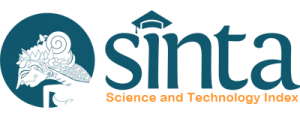Piety in Thoughts of John Wesley And Friedrich Schleiermacher
Abstract
It is a misconception to identify modernity with secularization. When modernity simply creates the potential platform for secularization. On the one hand, modernity lessens the influence of piety to a minimum, and on the other hand, it restores piety and even modernizes piety without secularization. This essay focuses on telling the story of modernity in attempting to build a knowledge of God through the lens of piety. It centers on the work of two modern theologians: John Wesley and Friedrich Schleiermacher. The juxtaposition of Wesley and Schleiermacher is not without reason. Both of them are strongly influenced by the Moravian Brethren, which heavily emphasized a pietistic element in their community. This essay, however, will not explain the teaching of Moravian Brethren other than presenting their pietistic emphasis that was retained in Wesley and Schleiermacher's works. This essay argues that Schleiermacher's notion of a feeling of absolute dependence’ fills the rational gap of Wesleyan pietistic concept. It also discusses how the ‘Evangelical Revival/First Great Awakening’ and ‘Romanticism’ shaped Wesley and Schleiermacher, respectively, as they formulated their concept of piety. This essay is structured as follows. First, it presents the Evangelical Revival/First Great Awakening as the historical backdrop of Wesley's thought and continues with exhibiting Wesley’s concept of piety. Then, the essay describes the Romantic era and Schleiermacher's idea of piety.
Adalah sebuah miskonsepsi untuk mengidentifikasi modernitas dengan sekularisasi, ketika modernitas hanya sekedar menciptakan panggung yang potensial untuk sekularisasi. Di satu sisi, modernitas mengurangi pengaruh kesalehan hingga taraf minimal, namun di sisi lain, modernitas memulihkan kesalehan. Makalah ini berfokus dalam menceritakan ulang kisah modernitas dalam upaya membangun pengetahuan akan Allah melalui lensa kesalehan. Makalah ini memusatkan diri pada karya dua teologi modern: John Wesley dan Friedrich Schleiermacher. Penjajaran Wesley dan Schleiermacher bukan tanpa alasan. Keduanya sangat dipengaruhi oleh Persaudaran Moravianyang sangat menekankan pada elemen kesalehan dalam komunitas mereka. Makalah ini, bagaimanapun, tidak menjelaskan pengajaran Persaudaraan Moravian selain menyajikan penekanan kesalehan yang dipertahankan dalam karya Wesley dan Schleiermacher. Makalah ini berupaya untuk menunjukkan bahwa gagasan Schleiermacher tentang perasaan akan ketergantungan absolut mengisi celah rasional dari konsep kesalehan John Wesley. Makalah ini juga membahas bagaimana Evangelical Revival/First Great Awakening dan Romantisisme membentuk Wesley dan Schleiermacher kala mereka merumuskan konsep kesalehan mereka masing-masing. Untuk mendukung argumen ini, makalah ini disusun sebagai berikut. Pertama, makalah ini menyajikan Evangelical Revival/First Great Awakening sebagai latar sejarah dari pemikiran Wesley dan dilanjutkan dengan menyajikan konsep kesalehan Wesley. Kemudian, makalah ini menjelaskan era Romantis dan konsep kesalehan Schleiermacher.
Keywords
Full Text:
PDFReferences
Barth Karl, The Theology of Schleiermacher: Lectures at Göttingen, Winter Semester of 1923/24, ed. Dietrich Ritschl. Grand Rapids: Eerdmans, 1982.
Blumhofer, Edith L. “Revivalism” in The Oxford Companion to United States History. Oxford University Press, 2001.
Carson, Nathan, A Preemptive Bagging of the Cat? Against the A Priori Reading of the “Introduction” to Schleiermacher’s Glaubenslehre. Waco, Texas: Baylor University, 2008.
Corlew, S. “Schleiermacher, and Romanticism: Ignored Antecedent of Postmodernism?” Social Science Research Network (February 3, 2013): 1-29.
Cross, F. L., and E. A. Livingstone, eds. “Moravian Brethren.” In The Oxford Dictionary of the Christian Church. Oxford University Press, 2009.
Daniels, Joel D. “Friedrich Schleiermacher: Pentecostal Friend or Foe.” Journal of Ecclesiology 14 (2018): 69-90.
Dole, Andrew. “The Case of the Disappearing Discourse: Schleiermacher’s fourth Speech and the field of Religious Studies.” The Journal of Religion 88 (January 2008):1-28.
Driel, Edwin Chr. van. “Schleiermacher‘s Supralapsarian Christology. ” Scottish Journal of Theology 60, Iss.03 (August 2007): 251-270.
Eaghll, Tenzan. “From Pietism to Romanticism: The Early Life and Work of Friedrich Schleiermacher.” In The Pietist Impulse in Christianity (Princeton Theological Monograph Series). Edited by Christopher Collins Winn, Eugene, OR: Pickwick Publications, 2011.
Field, David N. “John Wesley as a Public Theologian: The Case of Thoughts upon Slavery.” Journal of Scriptura 114, no. 1 (2015): 1-13.
Figueroa, Rady Roldan. “Rise of German Absolutism, Trajectories of German Pietism and Anglo-American Methodism.” Class Lecture presented at the Christianity Engaging Modernity (Spring 2018). Boston University School of Theology, Boston, MA, February 13, 2018.
Gockel, Matthias, “New Perspectives on an Old Debate: Friedrich Schleiermacher’s Essay on Election.” International Journal of Systematic Theology 6, no. 3 (July 2004):301-318.
Gordon, James, “A ‘Glaring Misunderstanding’? Schleiermacher, Barth and the Nature of Speculative Theology.” International Journal of Systematic Theology 16, no.3, (July 2014): 313-330.
Horman, Joe, “Grace Abounds: The Missiological IMplications of John Wesley’s Inclusive Theology of Other Religions.” Wesley Theological Journal 48, no. 1 (2013): 38-53.
Hempton, David. “John Wesley (1703-1791).” In The Pietist Theologians: An Introduction to Theology in the Seventeenth and Eighteenth Centuries, edited by Carter Lindberg. The Great Theologians. Malden, MA: Blackwell, 2005.
Jarlert, Anders. Piety and Modernity. Dynamics of Religious Reform in Church, State and Society in Northern Europe, 1780-1920; 3. Leuven, Belgium: Leuven: Leuven University Press; KADOC, Documentation and Research Centre for Religion, Culture and Society, 2012.
Maddox, Randy L., “Theology of John and Charles Wesley.” In T&T Clark Companion to Methodism, ed. Charles Yrigoyen, Jr., New York: T&T Clark, 2010, 20-35.
Morris-Chapman, Daniel J. Pratt. “Is the ‘Wesleyan Quadrilateral’ an accurate portrayal of Wesley’s theological method?” Journal of Theology and Ministry 5 (2018): 2.1-2.17.
Muers, Rachel. Modern Theology: A Critical Introduction. London ; New York: Routledge, 2012.
O’Brien, Glen. “John Wesley and Athanasius on Salvation in the Context of the Debate over Wesley’s Debt to Eastern Orthodoxy.” Journal of Phronema 28, no. 2 (November 4, 2013): 35-53.
_________. “John Wesley’s Rebuke to the Rebels of British America: Revisiting the Calm Address,” Journal of Wesleyan and Methodist Studies 4 (2012): 31–55.
Park, Jae-Eun. “Schleiermacher’s Perspective on Redemption: A Fulfillment of the Coincidentia oppositorum between the Finite and the Infinite in Participation with Christ.” Journal of Reformed Theology 9 (2015): 270-294.
Reynold, Thomas. “Reconsidering Schleiermacher and the Problem of Religious Diversity: Toward Dialectical Pluralism.” Journal of the American Academy of Religion 73, no. 1 (March 2005): 151-181.
Santayana, George. The Life of Reason. New York: Scribners, 1905.
Scandrett, Joel. ”A Catholic Spirit: John Wesley and TF Torrance in Ecumenical Perspective.” Journal of Participatio Supplemental, Vol.4: “Torrance and the Wesleyan Tradition” (2018): 112-143. https://tftorrance.org/2018-js-1.
Schel, Kevin M. Vander. “Christ and the Perfection of Creation in Schleiermacher‘s Dogmatic Theology.” Annals of Theology / Roczniki Teologiczne 64, no. 2 (2017): 47-67.
__________________________. “Election in Christ in Schleiermacher’s Christian Faith and Christian Ethics.” Journal of Open Theology 1, no. 1 (September 2015): 334–341.
Schleiermacher, Friedrich. The Christian Faith. Edited by H. R Mackintosh and James S. Stewart. Vol. 1. New York: Harper & Row, 1963.
Veldsman, Daniël P. “To Feel with and for Friedrich Schleiermacher: On Religious Experience.” Journal of HTS Theological Studies 75, no. 4 (2019): 1-5.
Weaver, C. Douglas, Rady Roldán-Figueroa, and Brandon Frick. Exploring Christian Heritage: A Reader in History and Theology. Waco, Tex.: Baylor University Press, 2012.
Werner, David. “John Wesley’s Question: "How Is Your Doing?” The Asbury Journal 65, no. 2 (2010): 68-93.
Yates, Kelly Diehl. “The Wesleyan Trilateral: Prevenient Grace, Catholic Spirit, and Religious Tolerance.” Wesleyan Theological Journal 48, no. 1 (2013): 54-62.
Yong, Amos. “A Heart Strangely Warmed on the Middle Way? The Wesleyan Witness in a Pluralistic World.” Wesleyan Theological Journal 48, no. 1 (2013): 7-27.
Zivadinovic, Dojcin. “Wesley and Charisma: An Analysis of John Wesley's View of Spiritual Gifts.” Andrews University Seminary Student Journal 1, no. 2 (2015): 53-71. https://digitalcommons.andrews.edu/cgi/viewcontent.cgi?article=1011&context=aussj
DOI: http://dx.doi.org/10.25278/jj.v18i1.426
viewed = 0 times


















